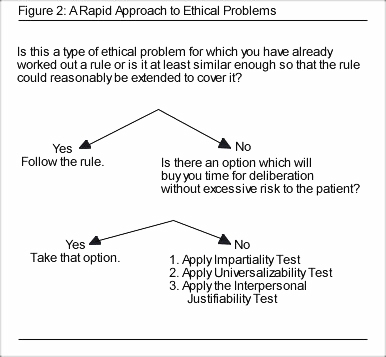|
Link:
 Ethics
in Emergency Medicine, 2nd ed. Ethics
in Emergency Medicine, 2nd ed.
A
Rapid Approach to Ethical Problems
From: Ethics In Emergency Medicine, Second Edition
Iserson
KV, Sanders AB, Mathieu D (Editors)
ISBN
1-883620-14-7
$39.95 Soft Cover
589 pages, Bibliography, index
©Galen Press, Ltd., Tucson, AZ, 1995

The
Impartiality Test
Would
you be willing to have this action performed if you were in the
other person's (the patient's) place? This is, in essence, a version
of the Golden Rule. Do unto others as you would have done unto you.
According to John Stuart Mill, this espouses "the complete
spirit of the ethics of utility." It is not an infallible rule
that will yield a right answer every time. It is intended, however,
to correct for one obvious source of moral error-partiality, or
self-interested bias. It asks practitioners to switch their point
of view, to take the other person's perspective. Usually, that is
useful to do and can at least help avoid a grievous error.
The
Universalizability Test
Are you willing
to have this action performed in all relevantly similar circumstances?
This generalizes the action and asks whether developing a universal
rule for the contemplated behavior is reasonable-an application
of Kant's categorical imperative. Is what you are about to do in
this particular case something you would approve of if it were generalized
to all cases of this sort? The usefulness of this test is that it
can help eliminate not only bias and partiality, but also shortsightedness.
In particular, it enables us to evaluate a particular action by
viewing it as an example of general practice in relevantly similar
circumstances. In some cases, we might approve of a particular action
if we viewed it on its own account, in complete isolation, but find
it unacceptable to adopt it as general practice. To the extent that
we are concerned with finding useful rules of action, focusing on
types of action-rather than particular actions in isolation-seems
appropriate, since rules are always to some extent general and hence
apply to types of actions. Justifying one particular instance that
falls under a rule is not sufficient for justifying the practice
of acting on that rule.
The
Interpersonal Justifiability Test
Are you able
to provide good reasons to justify your actions to others? Will
peers, superiors, or the public be satisfied with the answers? Could
you justify or defend your decision if it were questioned by someone
else? Could you give reasons for the course of action you took?
And, importantly, can you give reasons that you would be willing
to state publicly? This test uses David Gauthier's basic theory
of consensus values as a
final screen for a proposed action.
When ethical situations arise where no time exists for further deliberation,
it is probably best to go ahead and act on the rule or perform the
action that allows all three tests to be answered in the affirmative
with some degree of confidence. Once the crisis has subsided, however,
the practitioner should review the decision with the aid of colleagues
and bioethicists to refine his emergency ethical decision-making
abilities. In particular, it is crucial to ask whether the most
basic ethical values have been served by the decision-making process.
Were the actions taken in the emergency situation really consonant
with showing the kind of respect for patient autonomy which you
believe appropriate? Were the ethical decisions really in the patient's
best interest, or were you unduly influenced by the interests of
others or considerations of your own convenience or psychological
comfort? Were people treated fairly, justly, and equitably?
Ethical
problems, like emergency clinical problems, require action for resolution.
Ideally, one would have extensive discussions and time to reflect
on each ethical decision before needing to act on the decision.
This, of course, is not possible for many emergency care decisions.
Nevertheless, by making a sincere effort to anticipate recurring
types of problems, by subjecting them to ethical analysis in advance,
and by conscientiously reviewing decisions after they have been
made, the emergency care professional can better fulfill his or
her ethical responsibilities. The fact that a decision is an emergency
decision, therefore, does not remove it from the realm of ethical
evaluation.
|
 EXTRAS
EXTRAS
 Ethics
in Emergency Medicine, 2nd ed.
Ethics
in Emergency Medicine, 2nd ed.